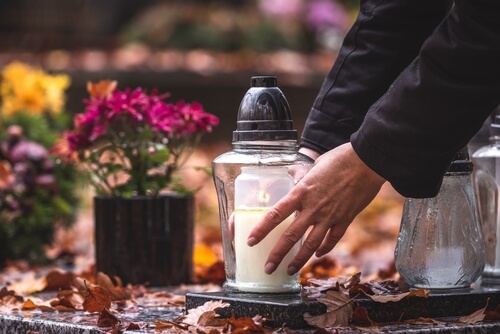
All of us will go through bereavement at some point, but despite this certainty, coping with bereavement can often be a lonely experience.
It is common to feel certain emotional and physical effects when grieving. Feelings of depression, anger and fear are normal, as are insomnia, loss of appetite, an aching, empty feeling and even panic attacks. Many people have heard of the ‘stages of grief’, but there is no one way to experience it.
Steven Wibberly is chief executive of Cruse Bereavement Care, the UK’s largest bereavement charity. He explains: “It can be very comforting to think that grief is a predictable journey, and that at some point we will reach the final stage and be able to move on with our lives.
However, we know that real life is never quite that simple. Everyone is unique and everyone’s grief is unique too. There are no set stages or phases that everyone passes through. It is however possible to pick out certain feelings and experiences which are very common.”
Tips for coping with bereavement
Andy Langford is clinical director at Cruse Bereavement Care. He advises: “One of the most helpful things is to talk about the person who has died and your relationship with them. Who you talk to will depend on you. It may be your family, friends, a faith/spiritual adviser, your GP or a support organisation.
Do
- Talk to other people about the person who has died, about your memories and your feelings
- Look after yourself. Eat properly and try to get enough rest (even if you can’t sleep)
- Give yourself time and permission to grieve
- Seek help and support if you feel you need it
- Tell people what you need
Don’t
- Isolate yourself (unless you have to, eg due to illness)
- Keep your emotions bottled up
- Think you are weak for needing help
- Feel guilty if you are struggling to cope
- Rely on drugs or alcohol – the relief will only be temporary.
Bereavement counselling
Many people seek professional support such as bereavement counselling. When somebody feels ready to do so is highly individual.
Andy Langford, clinical director at Cruse Bereavement Care says: “When to seek support from an organisation like Cruse will be a very individual decision, however from our experience people often come to us between a few months to a year after the bereavement, when they thought they ‘should’ be feeling better but aren’t. Cruse support is free of charge, however this differs with different organisations.
“Bereavement Volunteers all complete the Bereavement Support Foundation course. They also complete training in: supporting clients via the telephone and/or on-line, assessment and triage, safeguarding; trauma awareness, working with suicidal thoughts and feelings, and self-care. We can also support people in the aftermath of a major incident or disaster. Again we provide specific training to upskill our Volunteers to be able to support clients who may have lost someone in these circumstances.
“We also offer support to Children and Young People and our Volunteers who provide this support do have further training to enable them to work effectively.”
How Sharon coped with bereavement
Sharon lost her husband to melanoma, a form of skin cancer, in 2018. Here she shares an honest account of her grief and how she managed her bereavement.
“I met my husband when I was 17, married at 21 and lost him when I was 57, so I was married for 36 years. I actually started my grieving process 6 months before he died, though I tried to make the most of every minute, and we had some beautiful moments filled with love and laughter and joy, it was ultimately a time of sheer panic, and torture, knowing I was going to lose him.
‘I could not envisage life without him’
“I truly could not envisage a life without him. Even though I had two amazing grown up daughters, a part-time job I loved, hobbies, friends, my health … I was terrified of being on my own. I hadn’t really ever been an adult without him. He brought joy to my everyday life, always making me laugh, I truly did not want to live without him, and envisaged the rest of my life as a prison sentence.
“There is no good age to lose a husband, or wife, but I felt that 57 was an especially cruel age. It would coincide with empty nest syndrome, coming up to retirement. The joy of future grandchildren – all our future plans were robbed and taken away from us. And I would have to be a grandparent/retired person on my own, without the joy of sharing it.
‘I was very angry’
“I was very angry that my husband had been taken away from me, and at my age, all my friends still had their husbands. I was the first to be widowed. I found that I could not bear to be in the company of most other married women. In my oversensitive, emotional state, I took offence to their conversations, from talking about upcoming holidays (who could I go on holiday with?), to attempting to empathise with me.
“In the first six to eight months, I felt like I had fallen into a very deep pit. I no longer wanted to end my life because I did not want to put my daughters through another bereavement, but I found coping mechanisms to help me get through, one day at a time.
“I developed a routine, a walk or some exercise, then my favourite part of the day would be to go into a coffee shop or café and write my diary. My husband used to write a diary for every day of his life, and during his terminal illness, I found it also helped me to write down my feelings. At the end of the day, during this terminal diagnosis, we would both sit out in the sunshine together, with a glass of wine, writing our diaries.
‘I wrote to him’
“When I started to write after my husband’s death, I felt close to him. In fact, I wrote to him, telling him all the news and how I was coping. Sometimes I would use his expressions and terminology, almost like I was taking on his personality, and that he was flowing through me with his words.
“I would lie down and have a rest or a sleep, because I was not sleeping well at night. Then, I would do some of my part-time teaching work.
“Eating dinner alone was the worst thing, I had no desire to cook or eat, and I always had 2 or so glasses of wine, as I could not cope with the evening alone, without him, or the wine!
“However, two evenings a week, I did not drink, as those nights I drove, Tuesdays to choir, and Fridays to play guitar with my guitarist friends. These nights were good for me, but I always cried driving home. It was always terrible to return to the empty house.
So, everybody is different, but having a daily routine in the first year definitely helped me. It was like a rope ladder, giving me steps to climb out of my deep pit, and enabling me to get through the day.
“I especially sought out other widows who I felt closer to, as we understood how we all felt and some friendships blossomed. I joined Way Up, a bereavement group for widows and widowers, for ages 50-70, and I bonded with others who were also in this “club that nobody wants to join”. Way Up has online support and discussion groups, where members can post articles, swap advice, share stories, many of which are inspirational. There are many social activities, coffee mornings and even holidays.
‘Exhaustion’
“What people probably don’t appreciate that the bereaved are going through is their ‘exhaustion’, their lack of concentration. So even though we are lonely, we cannot cope with trivial conversation, especially if people try to ‘jolly us up’. It must be difficult for people to know what to say to the recently bereaved, as there are so many ‘taboo’ subjects. In fact, nearly all ‘small talk’ is unbearable for us.
“The recently bereaved are not always depressed. In fact, they can be ecstatically happy. I used to swing from very happy then plummet very quickly to the depths of despair. Pain can feel intense and physical. I have felt such extreme pain, that I honestly felt I would die. When that excruciating intense pain comes, it does not last long, and our bodies give us release.

“Two years on, I still miss my husband and I think about him every hour of every day. I still cry and get my dips, but I come out of them very quickly now. There are many good things in my life. I have become a grandmother of a beautiful 11-month-old girl and I only have to look at her beautiful face to see my husband’s expressions in her.
New relationships
“I have a relationship with a widower. We understand each other. We are falling in love, but there are four people in our relationship – his late wife, my late husband, and us. Having a new relationship does not take away from the grieving process, but stops us being lonely, and gives fun and excitement back into our lives. It is not for everyone, I just couldn’t bear the thought of never loving, or being loved by a man for the rest of my life. I am used to a good thing! I had such an amazing husband.
“The most significant thing now, is that the anger has gone away. Instead of thinking how unlucky I am, I am able to turn it around and say how lucky I am to have lived and loved. And to love again. Whilst my husband’s life ended far too early (he was only 61), I am grateful for all my years, months and weeks I had with him, because it could have been even less.”
How to support the bereaved
Knowing what to say to somebody who is in mourning can be very difficult. Sometimes there is nothing you can say. Grief can be a long process, but you can support the bereaved person through it in a way that is practical and empathetic to their situation and needs.
Sharon says: “Recently bereaved people do not eat or sleep very well. The kindest most helpful thing to do would be to cook a meal for them, maybe have a glass of wine with them and offer to eat with them in their home. The last thing we want to do is eat in other people’s homes with other married couples, making us feel (not intentionally) even more left out.
Bereavement needs to be treated ‘almost like a physical illness’
“The bereaved person really does feel like they have been hit by a bus! It needs to be treated almost like it is a physical illness. They need good food, warmth, rest and sleep. Somebody to talk to, who would be a very good listener. We may only want to talk about the person we have lost; we will not be good listeners ourselves, we are too exhausted to listen to others, which does not make us very good company!
“Don’t compare bereavements. Everyone is individual. I like to be with other widows and widowers because I feel we are all on the same page. Likewise, parents who have lost a child may seek comfort from other bereaved parents. I don’t pretend to know what it would be like to lose a child. I don’t like people assuming they understand how I feel. Just listening is one of the kindest things someone can do.”
Charities
| Cruse Bereavement Care | Helpline: 0808 808 1677 | Cruse chat |
| Way Up | Contact form | |
| Samaritans | Telephone: 116 123 | Email: jo@samaritans.org |


